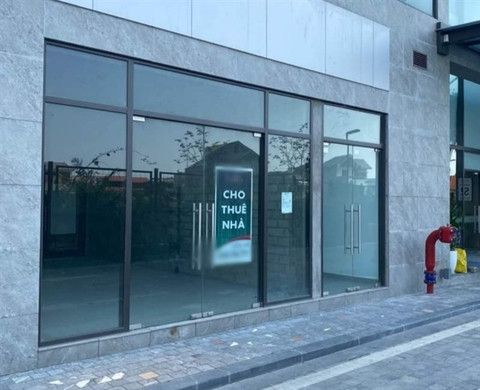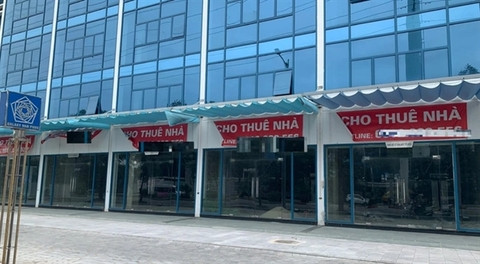
A shophouse available for rent at an apartment building in Hà Nội. — VNA/VNS Photo
Nguyễn Văn Ngọc, a 50-year-old investor from the northern province of Bắc Giang, has been struggling to sell a shophouse in Hà Nội's Hà Đông District for over a year.
Due to low rental income and high monthly loan payments, he is under immense financial pressure.
Despite offering a 20 per cent discount on the purchase price of VNĐ23 billion at the end of 2021, he has not been able to attract any potential buyers.
In recent years, investing in shophouses has been a popular trend in cities like Hà Nội and HCM City. Many investors saw it as a lucrative opportunity to make a profit by buying a shophouse and reselling it at a higher price.
However, the reality has been harsh for many, as they struggle to find tenants and face financial losses.
Another investor in Hà Nội, who asked to be unnamed, in early 2022 purchased a shophouse located in the eastern part of Hà Nội for VNĐ17 billion, hoping to resell it at a higher price.
However, the property has remained vacant for a year despite its location in a densely populated residential area. The investor is now willing to sell at a loss of 30 per cent, but still hasn’t found a buyer.
The situation is similar in areas like Tố Hữu Street in Hà Đông District and Nguyễn Văn Huyên Street in Cầu Giấy District, where numerous shophouse owners are struggling to find tenants.
Võ Hồng Thắng, deputy director of Research and Development at DKRA Group, said factors such as unfavourable locations, insufficient population density, lack of amenities, and underdeveloped infrastructure make it challenging to attract tenants.
High purchase prices and rental rates further deter potential tenants, causing financial losses for the owners, he said.
For many shophouse investors, the pressure of using financial leverage has forced them to sell at a loss, he added.
“Finding tenants in newly formed residential areas with low population density has also proven to be a challenge,” he noted.

Plenty of shophouses currently available for rent at a property development in HCM City. — VNA/VNS Photo
Experts have also pointed out that shophouses are better suited for long-term investors who are willing to wait for the property value to increase.
Đỗ Thị Thu Hằng, senior director of Savills Hà Nội, said developers have also played a role in the oversupply of shophouses, as they didn’t carefully plan and attract specific industries.
Between 2020 and 2022, shophouses became a popular investment channel, with a large percentage of buyers being speculators looking to sell at a profit.
Only a small percentage of buyers intended to operate businesses, and many of them were caught up in the trend without accurately assessing the potential profit rate.
The overall economic slowdown and the rise of online shopping have also contributed to the high vacancy rates in shophouses.
The shift towards e-commerce platforms has reduced the demand for traditional brick-and-mortar retail spaces.
In major cities like Hà Nội and HCM City, rental rates for shophouses are often very high, making it difficult for small enterprises or start-ups to afford the rent.
Despite the current challenges, shophouse investment can still be successful with proper research and analysis, experts noted.
Potential investors should accurately assess the market, location, and potential rental income before making a purchase, they recommended.
Investors should also consider the overall economic conditions and shifts in consumer behaviour.
For now, shophouse investors may have to wait for the population density in projects to increase before seeing an improvement in profit rates.
The trend may have lost its shine, but with careful consideration and evaluation, it is still possible to make a successful investment in the shophouse market, experts noted. — VNS